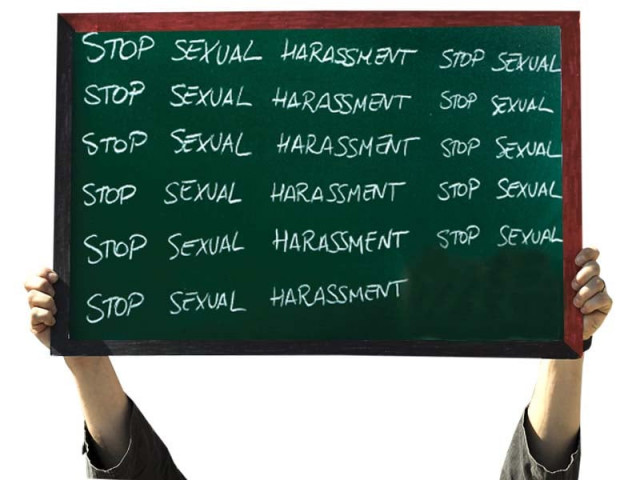Harassment law: Experts highlight role of social media, documentaries
Claim people need to take part in law’s implementation for real ‘change’ to come.

Violation of the dignity of another person through psychological, physical, verbal, non-verbal, strategic, territorial ways is sexual harassment, agreed experts at a public discussion on Wednesday. They also agreed that collective efforts on more effective implementation of the law and changing mindsets could help in reducing the crime of sexual harassment.
A public discussion on ‘Sexual Harassment and Anti-Sexual Harassment Act 2010’ was held at Frederic Ebert Stiftung’s office during the screening of a documentary ‘Dekh Magar’ made by a private TV channel under its monthly film screening named ‘MovieLog- Think-Challenge-Question.’
Mehrgarh Director Maliha Hussain, Lok Virsa Deputy Director (media) Sajid Munir, Rabia Aslam, a researcher from the Centre of Excellence in Gender Studies Department, Quaid-e-Azam University, and Walid Malik, a student from Goethe University, Frankfurt, Germany, were among the panellists. Andrea Fleschenberg, who is Deutscher Akademischer Austauschdienst (DAAD) long-term guest professor at QAU, moderated the session.
Hussain said documentaries can play an important role in making people aware about important issues of society, adding that people did not even consider sexual harassment a crime before the Anti-Sexual Harassment Act 2010 was introduced. “People were educated about the issues through media. Once the laws are properly implemented, work efficiency will also increase.”
Documentaries help raising questions and discussion that sometimes are not possible in day to day life in our social circles, said Munir. “If the documentaries relate to issues, it gives courage to many to speak about social issues.”
Aslam said that issues-based documentaries and films were important educational tools, adding that audio-visual things have better impact on people.
In the second round of talks, Hussain said the Anti-Sexual Harassment Act 2010 became a reality through the help of various segments of society, including media, politicians and civil society. In the last four and a half years, she said, the statistics showed that the laws have really helped the victims of sexual harassment. “I personally know thousands of women who registered complaints against sexual harassment.”
She said that more than 4,000 cases have been reported in the last three years, adding that serious actions were also taken to resolve the issues. In addition, she gave the example of the State Bank of Pakistan which gave banks one year to implement the laws as reports of sexual harassment cases would be included in audit reports.
The experts said people should come forward to take part in the process of implementation of laws as only then would things change. They added that a number of studies revealed that ‘what a person wears has nothing to do with sexual harassment.’
Walid, while sharing his experience from Germany, said documentaries and social media could be a very effective way of talking about issues. He said Germany has several layers of its law on sexual harassment and implementation is stronger than in Pakistan.
Civil society members, academics, students and youth activists participated in the discussion.
Published in The Express Tribune, September 11th, 2014.



















COMMENTS
Comments are moderated and generally will be posted if they are on-topic and not abusive.
For more information, please see our Comments FAQ